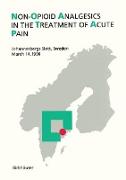Non-Opioid Analgesics in the Treatment of Acute Pain
BücherAngebote / Angebote:
Dipyrone is widely acknowledged to be an effective antipyretic analgesic with an additional intrinsic spasmolytic activity. It has stood the test of time over the last 75 years in many clinical settings throughout the world. Some 20 years ago, however, concern arose over the implications of isolat ed reports of agranulocytosis following use of dipyrone. Based on these initial cases the Swedish authorities ordered the withdrawal of the drug from the market. Subsequently, dipyrone has been subjected to extensive comparative epidemiological and clinical studies. The results of these in vestigations have allayed the earlier concerns and have shown dipyrone to be a versatile analgesic drug with an overall risk of serious adverse events lower than most other non-opioid analgesics. Based on these results, the Swedish authorities (Lakemedelsverket) have approved the reintroduc tion of dipyrone to clinical use as a valuable contribution to pain treat ment. In connection with this further milestone in the story of the drug, a symposium was held in Stockholm on March 14, 1996, under the chairman ship of Professor N. Rawal to review the current understanding of the ac tion, efficacy and safety of dipyrone. The highlights of this Hoechst symposium emphasize particularly the therapeutic basis for the use of dipyrone in the modern treatment of acute post-operative pain. 9 Mode of action of dipyrone Professor K. Brune, M. D. Erlangen, Germany Most non-opioid analgesic drugs are inhibitors of cydo-oxygenase, the en zyme catalysing the formation of prostaglandins (PGs).
Folgt in ca. 5 Arbeitstagen

